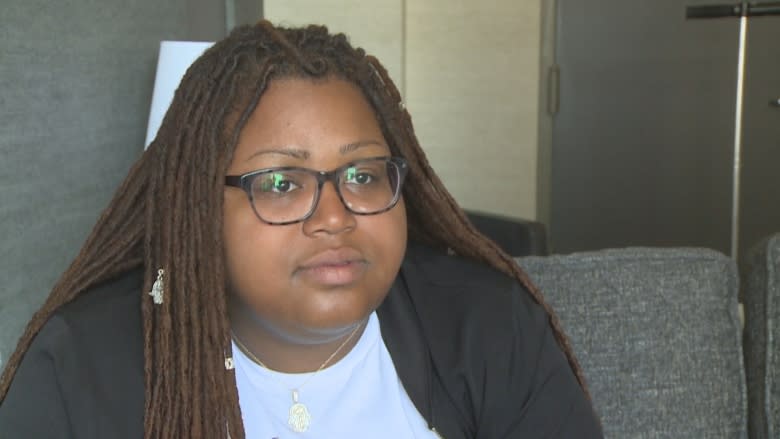Bob Marley's granddaughter threatens to sue after being detained by police while leaving Airbnb
For Toronto filmmaker Kelly Fyffe-Marshall, it started with a joke.
She and three other young people, including the granddaughter of Bob Marley, Donisha Prendergast, were preparing to leave a house they had been renting through Airbnb in Rialto, Calif.
As they packed up, she spotted a neighbour watching them from far away and joked that the woman was going to call the police.
A few minutes later, surrounded by cruisers and officers, it was a joke no more.
"My first thought was that we were going to be shot," Fyffe-Marshall said in an interview with CBC on Friday.
Fyffe-Marshall and Prendergast, along with Ottawa artist Komi-Oluwa Olafimihan, opened up about the incident that's captured international attention and sparked a heated conversation about racial profiling and policing.
It was mid-day last Monday in Rialto, a small city near Los Angeles, when a white woman who lived near the Airbnb-rented house spotted the group, composed of two black women, a black man, and a white woman, packing their luggage into a car.
Concerned that a burglary was in progress, she called the Rialto police force.
Interaction 'escalated'
Prendergast described what happened next as "surreal."
Officers arrived and the four young people were asked to stay in their car, produce ID, and answer questions from police about why they were there.
"From the first moment, I was embarrassed for them," Prendergast said of the police.
Fyffe-Marshall said that officers initially told them to put their hands up, and she looked at Olafimihan, fearing he'd be shot and that she'd have to sit next to him, unable to help.
In an Instagram video of the interaction, Prendergast and Fyffe-Marshall can be heard asking an officer if the call was made because they are black.
"It's possible," answers the officer.
"It's not possible, it's what's happening," responds Fyffe-Marshall.
Olafimihan, who had never been stopped by police before, wrote in a post on social media that it was about 20 minutes into the interaction that "this misunderstanding escalated almost instantly."
He said a newly arrived sergeant insisting the group was lying about renting the home. His fear intensified, he said, when he saw an officer take out a knife, something Fyffe-Marshall mentioned as well.
She believes the officer was using it to clean under his fingernails.
"When you call the cops on a black person that is innocent based on the colour of their skin, you are jeopardizing a lot of things," Olafimihan told CBC Toronto. "By branding them based off of your fear, you're taking the world backwards."
Neighbour should be held accountable: lawyer
Now, the group is considering legal action against the Rialto Police Department.
"We want to review the evidence for ourselves and determine the extent to which their constitutional rights were violated," said the trio's lawyer, Jasmine Rand, in a Thursday press conference.
She added that they also want action taken against the neighbour, who Rand said called the police because the group failed to smile or wave back at her when she waved at them.
"Under the laws of the state of California, if a person places a false or misleading call to law enforcement, they can be held criminally liable," she said, calling for a criminal investigation to be opened.
"They have a right not to smile on command at the behest of a white woman," said Rand.
Rialto police say interaction was 'jovial'
Rialto police, meanwhile, maintain that the interaction was carried out with "respect and dignity."
Mark Kling, the interim police chief, said at a news conference that the group was immediately released once they provided sufficient evidence that they were in fact renting the house.
The police force also opted to release body camera footage from two officers at the scene, with Kling stressing the "jovial" nature of the interactions.
Once the group of young people exits their car, they can be seen chatting with police officers.
One officer, who Kling says is Canadian, can be heard laughing and joking over the fact that Fyffe-Marshall is from Toronto.
Takeaways from Canadian policing
Jamaica-born Prendergast is the daughter of Sharon Marley Prendergast, Rita Marley's biological daughter who was adopted by Bob Marley when the two wed.
Donisha Prendergast told CBC that her experience living in Toronto has shown her that "there are better ways to interact with each other, there are better ways to police."
She said that though Canadian policing wasn't perfect, she'd like to encourage the U.S. to "embrace diversity and be more inclusive in how they approach law" and perhaps take a page from the book of their northern neighbours.
As she looks forward, she says she wants to find healing beyond legal recourse.
"We're talking about individuals who have been perpetuating a system," she said.
"We want to have conversations with the Rialto police, we want to have conversations with the mayor, we want to have conversations with the community."



